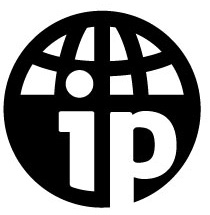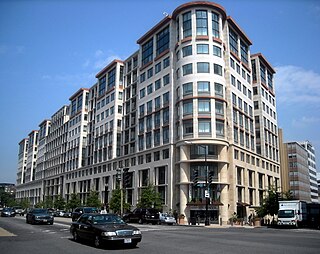
The World Health Organization (WHO) is a specialized agency of the United Nations that is concerned with international public health. It was established on 7 April 1948, and is headquartered in Geneva, Switzerland. The WHO is a member of the United Nations Development Group. Its predecessor, the Health Organisation, was an agency of the League of Nations.

The International Bank for Reconstruction and Development (IBRD) is an international financial institution that offers loans to middle-income developing countries. The IBRD is the first of five member institutions that compose the World Bank Group, and is headquartered in Washington, D.C., United States. It was established in 1944 with the mission of financing the reconstruction of European nations devastated by World War II. The IBRD and its concessional lending arm, the International Development Association, are collectively known as the World Bank as they share the same leadership and staff. Following the reconstruction of Europe, the Bank's mandate expanded to advancing worldwide economic development and eradicating poverty. The IBRD provides commercial-grade or concessional financing to sovereign states to fund projects that seek to improve transportation and infrastructure, education, domestic policy, environmental consciousness, energy investments, healthcare, access to food and potable water, and access to improved sanitation.
The World Bank Group (WBG) is a family of five international organizations that make leveraged loans to developing countries. It is the largest and most well-known development bank in the world and is an observer at the United Nations Development Group. The bank is based in Washington, D.C. and provided around $61 billion in loans and assistance to "developing" and transition countries in the 2014 fiscal year. The bank's stated mission is to achieve the twin goals of ending extreme poverty and building shared prosperity. Total lending as of 2015 for the last 10 years through Development Policy Financing was approximately $117 billion. Its five organizations are the International Bank for Reconstruction and Development (IBRD), the International Development Association (IDA), the International Finance Corporation (IFC), the Multilateral Investment Guarantee Agency (MIGA) and the International Centre for Settlement of Investment Disputes (ICSID). The first two are sometimes collectively referred to as the World Bank.

The International Development Association (IDA) is an international financial institution which offers concessional loans and grants to the world's poorest developing countries. The IDA is a member of the World Bank Group and is headquartered in Washington, D.C., United States. It was established in 1960 to complement the existing International Bank for Reconstruction and Development by lending to developing countries which suffer from the lowest gross national income, from troubled creditworthiness, or from the lowest per capita income. Together, the International Development Association and International Bank for Reconstruction and Development are collectively generally known as the World Bank, as they follow the same executive leadership and operate with the same staff.

The United Nations Development Programme (UNDP) is the United Nations' global development network.

The Global Environment Facility (GEF) was established on the eve of the 1992 Rio Earth Summit to help tackle our planet’s most pressing environmental problems. The GEF unites 183 countries in partnership with international institutions, civil society organizations (CSOs), and the private sector to address global environmental issues while supporting national sustainable development initiatives. Since 1992, the GEF has provided over $17 billion in grants and mobilized an additional $88 billion in financing for more than 4000 projects in 170 countries. Through its Small Grants Programme (SGP), the GEF has invested $450million and leveraged similar levels of co financing supporting over 14,500 community based projects in over 125 countries.

International development or global development is a broad concept denoting the idea that societies and countries have differing levels of 'development' on an international scale. It is the basis for international classifications such as developed country, developing country and least developed country, and for a field of practice and research that in various ways engages with international development processes. There are, however, many schools of thought and conventions regarding which are the exact features constituting the 'development' of a country.

The International Food Policy Research Institute (IFPRI) is an international agricultural research center founded in the early 1970s to improve the understanding of national agricultural and food policies to promote the adoption of innovations in agricultural technology. Additionally, IFPRI was meant to shed more light on the role of agricultural and rural development in the broader development pathway of a country. The mission of IFPRI is to provide research-based policy solutions that sustainably reduce poverty and end hunger and malnutrition.
Caroline Elizabeth Doggart(born 1939), is a development economist and author.

The United Nations Department of Economic and Social Affairs is part of the United Nations Secretariat and is responsible for the follow-up to major United Nations Summits and Conferences, as well as services to the United Nations Economic and Social Council and the Second and Third Committees of the United Nations General Assembly. UN DESA assists countries around the world in agenda-setting and decision-making with the goal of meeting their economic, social and environmental challenges. It supports international cooperation to promote sustainable development for all, having as a foundation the 2030 Agenda for Sustainable Development and the 17 Sustainable Development Goals (SDGs) as adopted by the UN General Assembly on 25 September 2015. In providing a broad range of analytical products, policy advice, and technical assistance, UN DESA effectively translates global commitments in the economic, social and environmental spheres into national policies and actions and continues to play a key role in monitoring progress towards internationally agreed-upon development goals. It is also a member of the United Nations Development Group.
The Aga Khan Fund for Economic Development (AKFED) is the sole for-profit agency of the Aga Khan Development Network (AKDN) and works in partnership with international organizations and governments to stimulate the private sectors of developing economies, with the aim of generating capital for investment into long-lasting and sustainable development initiatives. The agency’s operations include, but are not limited to, industry and tourism. Critical to the development process are goods and services including financial institutions, and infrastructure, such as power generation and communications, which together comprise some of AKFED’s initiatives.
Impact evaluation assesses the changes that can be attributed to a particular intervention, such as a project, program or policy, both the intended ones, as well as ideally the unintended ones. In contrast to outcome monitoring, which examines whether targets have been achieved, impact evaluation is structured to answer the question: how would outcomes such as participants' well-being have changed if the intervention had not been undertaken? This involves counterfactual analysis, that is, "a comparison between what actually happened and what would have happened in the absence of the intervention." Impact evaluations seek to answer cause-and-effect questions. In other words, they look for the changes in outcome that are directly attributable to a program.
The Leibniz Institute of European History (IEG) in Mainz, Germany, is an independent, public research institute that carries out and promotes historical research on the foundations of Europe in the early and late Modern period. Though autonomous in nature, the IEG has close connections to the Johannes Gutenberg University Mainz. In 2012, it joined the Leibniz Association.

The Inspection Panel is an independent accountability mechanism of the World Bank. It was established in September 1993 by the World Bank Board of Directors, and started operations on August 1, 1994. The Panel provides a forum for people who believe that they may be adversely affected by Bank-financed operations to bring their concerns to the highest decision-making levels of the World Bank. The Panel determines whether the Bank is complying with its own policies and procedures, which are designed to ensure that Bank-financed operations provide social and environmental benefits and avoid harm to people and the environment. The Inspection Panel was the first body to promote accountability among international financial institutions through this community-led, or “bottom-up”, approach which is complementary to the “top-down” forms of accountability, such as evaluation initiated by the World Bank itself. Building on this example, other multilateral and regional financial institutions have established similar accountability mechanisms as part of broader efforts at sustainable and equitable development.
The Enhanced Integrated Framework for Trade-Related Assistance for the Least Developed Countries is a global development program with the objective of supporting least developed countries (LDCs) to better integrate into the global trading system and to make trade a driver for development. The multi-donor program was launched on 1 January 2007 as the successor of the Integrated Framework for Trade-Related Technical Assistance to the Least-Developed Countries, which existed from October 1997 to December 2006. The second phase of the EIF has started on 1 January 2016 and will last for 7 years.

The Institute of Economic Growth, is an autonomous body under the Government of India, founded in 1958 by the renowned economist, V. K. R. V. Rao, for advanced research on economic and social development. It is widely regarded as a centre of excellence in the field. The Institute is situated on Malka Gunj road, at University Enclave, University of Delhi, New Delhi, India.
Uzbekistan became a World Bank member in 1992, shortly after declaring independence in 1991 following the collapse of the Soviet Union. The World Bank has supported projects in Uzbekistan in the areas of education, infrastructure, agriculture, and water resource management. Uzbekistan's collaboration with the bank has been increasing, with IBRD and IDA lending reaching a recent peak of $500 million in 2015. The World Bank has provided financing for 27 projects through the IBRD and IDA in throughout its relationship with Uzbekistan, with 15 active projects as of June 2017. Current IBRD and IDA projects total $1.9 billion.








